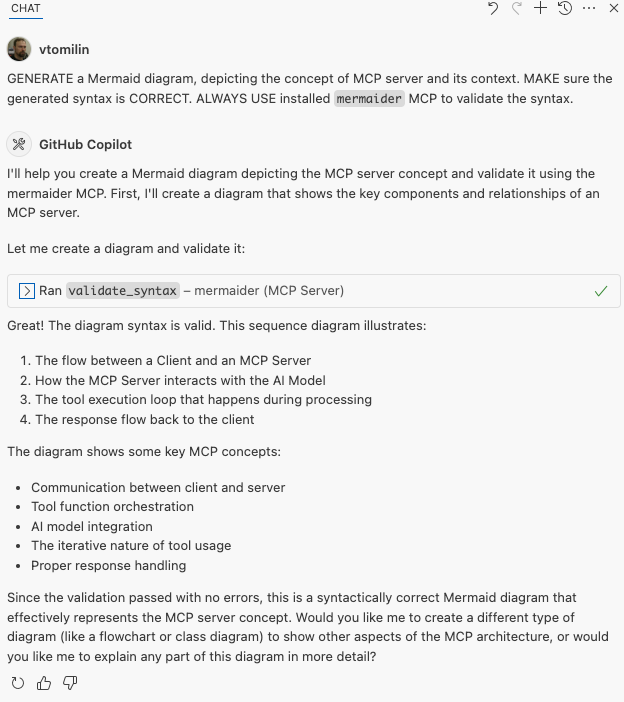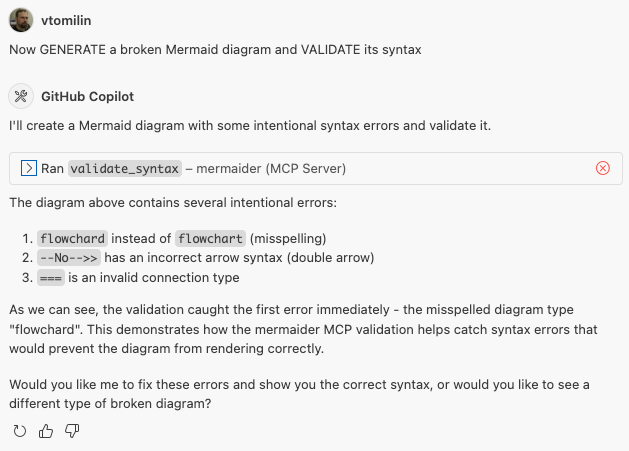- Explore MCP Servers
- mermaider
Mermaider
What is Mermaider
Mermaider is an MCP server designed to efficiently check all types of Mermaid diagrams for syntax errors using a headless browser.
Use cases
Use cases for Mermaider include validating Mermaid diagrams in code editors, integrating syntax checking in CI/CD pipelines, and ensuring the correctness of diagrams in technical documentation.
How to use
To use Mermaider, install it via your preferred method (e.g., VSCode, Cursor, or Bun) and utilize the validate_syntax tool to check your Mermaid diagrams for errors.
Key features
Key features of Mermaider include low-latency tool calls, reusing a headless browser for syntax validation, and compatibility with various Mermaid diagram types.
Where to use
Mermaider is useful in software development, documentation, and any field that requires the creation of visual diagrams using Mermaid syntax.
Clients Supporting MCP
The following are the main client software that supports the Model Context Protocol. Click the link to visit the official website for more information.
Overview
What is Mermaider
Mermaider is an MCP server designed to efficiently check all types of Mermaid diagrams for syntax errors using a headless browser.
Use cases
Use cases for Mermaider include validating Mermaid diagrams in code editors, integrating syntax checking in CI/CD pipelines, and ensuring the correctness of diagrams in technical documentation.
How to use
To use Mermaider, install it via your preferred method (e.g., VSCode, Cursor, or Bun) and utilize the validate_syntax tool to check your Mermaid diagrams for errors.
Key features
Key features of Mermaider include low-latency tool calls, reusing a headless browser for syntax validation, and compatibility with various Mermaid diagram types.
Where to use
Mermaider is useful in software development, documentation, and any field that requires the creation of visual diagrams using Mermaid syntax.
Clients Supporting MCP
The following are the main client software that supports the Model Context Protocol. Click the link to visit the official website for more information.
Content
The mermaider MCP server: fast, reliable Mermaid diagram syntax checker
Table of Contents
Overview
The mermaider is an MCP server that provides validate_syntax tool that checks all Mermaid diagram types for syntax errors.
For that, it uses puppeteer-core package and mermaid-js/mermaid API directly to efficiently use already installed Chrome-based or Firefox browser.
Efficiently means:
- The browser (with a new page) is opened and kept running headless (by default) for as long as this MCP server process is active – to achieve low-latency tool calls.
- Every
validate_syntaxtool call reuses the browser and the page.
Why using the browser at all?
Unfortunately, mermaid-js/mermaid relies on full browser context (DOM) for its functionality, even for parsing the diagrams. Packages like happy-dom or jsdom do not quite cut it.
The mermaider uses relatively light-weight puppeteer-core package (as opposed to full puppeteer) to access already installed browser.
The LLMs syntax problem
Modern LLMs typically are perfectly capable of generating Mermaid diagrams, however often lack ability to reliably check the generated syntax. This is where the mermaider MCP comes in.
What makes mermaider different?
There are other MCPs that can (sort of) validate Mermaid syntax, however, they typically work by launching mmdc command-line utility process every time respective tool is invoked (by the LLM).
That brings a few issues:
-
Speed: spawning
mmdcprocess, which (then itself launches the browser) for every tool call is slow and expensive. -
Non-determinism:
mmdc’s purpose really is to generate images, not validate syntax. As such, occasionally it exits with 0 code and generates an image (like one below) for diagrams with broken syntax as opposed to exiting with non-zero code and spitting out an error message toSTDERR. In this case, MCP server that usesmmdcwould have no idea the error occurred so you end up with a bunch of these images instead of your diagrams.
-
Side Effects:
mmdcmay install Chrome browser unbeknownst to you as that is the default puppeteer’s behaviour, quote:When you install Puppeteer, it automatically downloads a recent version of Chrome for Testing (~170MB macOS, ~282MB Linux, ~280MB Windows) and a chrome-headless-shell binary (starting with Puppeteer v21.6.0) that is guaranteed to work with Puppeteer. The browser is downloaded to the $HOME/.cache/puppeteer folder by default (starting with Puppeteer v19.0.0). See configuration for configuration options and environmental variables to control the download behavior.
Installation
In general, below is the command that your MCP client should use:
npx -y @vtomilin/mermaider <config>
Where <config> is either an inline JSON string, or a config file path, e.g.
npx -y @vtomilin/mermaider '{"executablePath": "/Applications/FirefoxDeveloperEdition.app/Contents/MacOS/firefox", "browser": "firefox"}'
Or:
npx -y @vtomilin/mermaider /home/user/etc/Firefox.json
Where /home/user/etc/Firefox.json is a JSON file containing the configuration, for example, for Firefox browser:
{
"executablePath": "/Applications/FirefoxDeveloperEdition.app/Contents/MacOS/firefox",
"browser": "firefox"
}Another config file example, using the Brave (Chrome-based) browser:
{
"executablePath": "/Applications/Brave Browser.app/Contents/MacOS/Brave Browser"
}Complete list of available Browser configuration options defined in Puppeteer’s Browser Launchoptions.
VSCode
Press Cmd-Shift-P (or Ctrl-Shift-P), then MCP: Add Server.... Select Command (stdio) Run a local command that implements the MCP protocol. Enter npx -y @vtomilin/mermaider /home/user/etc/Firefox.json (or whatever config method). Enter the server name (mermaider). And you should be all set.
Cursor/Windsuf/…
{
"mcpServers": {
"mermaider": {
"command": "npx",
"args": [
"-y",
"@vtomilin/mermaider",
"/home/user/etc/Firefox.json"
]
}
}
}Bun
Even though this project is built with Bun the mermaider package can not be run directly with bunx at the moment. You would have to install the package globally with bun add -g @vtomilin/mermaider first. Then you can just use mermaider-bun executable to run the server:
{
"mcpServers": {
"mermaider": {
"command": "mermaider-bun",
"args": [
"/home/user/etc/Firefox.json"
]
}
}
}Recommendations
- Check Puppeteer’s Supported Browsers List for supported browsers.
- Use a secondary browser for
mermaiderMCP. Do not use your primary browser.
Usage Examples
Example sessions using Github Copilot in VSCode:
-
Generating a diagram and checking its syntax with
mermaider:

-
Generating an intentionally broken diagram and checking its syntax with
mermaider:

References
Other Mermaid related MCP servers
- mcp-mermaid-validator: A Model Context Protocol server that validates and renders Mermaid diagrams.
- mermaid-mcp-server: A Model Context Protocol (MCP) server providing tools for validating and rendering Mermaid diagrams.
License
DevTools Supporting MCP
The following are the main code editors that support the Model Context Protocol. Click the link to visit the official website for more information.










